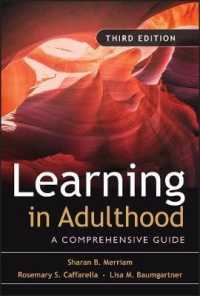- ホーム
- > 洋書
- > 英文書
- > Business / Economics
Full Description
For all of their focus on asset prices, financial economists rarely ask if assets are priced ethically-that is, if their prices are compatible with the public good. Yet in a world facing major, possibly catastrophic problems-global warming, for instance, and growing inequality-it is now more important than ever that we allocate capital to projects that will benefit society as a whole, not just today but far into the future. In this book, Christian Gollier develops a powerful method for transforming our societal goals of collective prosperity into the cornerstone of our financial decision making. Ethical Asset Valuation and the Good Society starts by stating transparent moral principles and, from these, derives simple rules that can be used to evaluate saving and investment decisions in terms of the public good. Rather than trying to explain observed asset prices, Gollier derives what these prices ought to be in order to direct capital toward socially desirable investments. He focuses especially on the two prices that drive most financial decisions-the price of time as reflected in the interest rate and the price of risk-and explores the role these play in our long-term planning.
If investment projects in renewable energy could be financed at a lower interest rate than those linked to fossil fuels, for instance, the energy transition would be easier to accomplish. Building on criticism of the short-term thinking of financial markets, Gollier suggests ways to shift investment toward the future through the discounting of the valuation of assets and investments with long-term benefits. In this sophisticated but accessible work, Gollier builds a bridge between welfare economics and finance theory to provide a framework for ethical valuation capable of establishing what asset prices should be on the basis of our shared moral values.
Contents
Acknowledgments
Introduction
1. Collective Aspirations
2. Choice and Measure of Values
3. Do We Do Enough for the Future?
4. Is The World Too Risky?
Conclusion
Technical Appendix
Notes
Bibliography
Index







